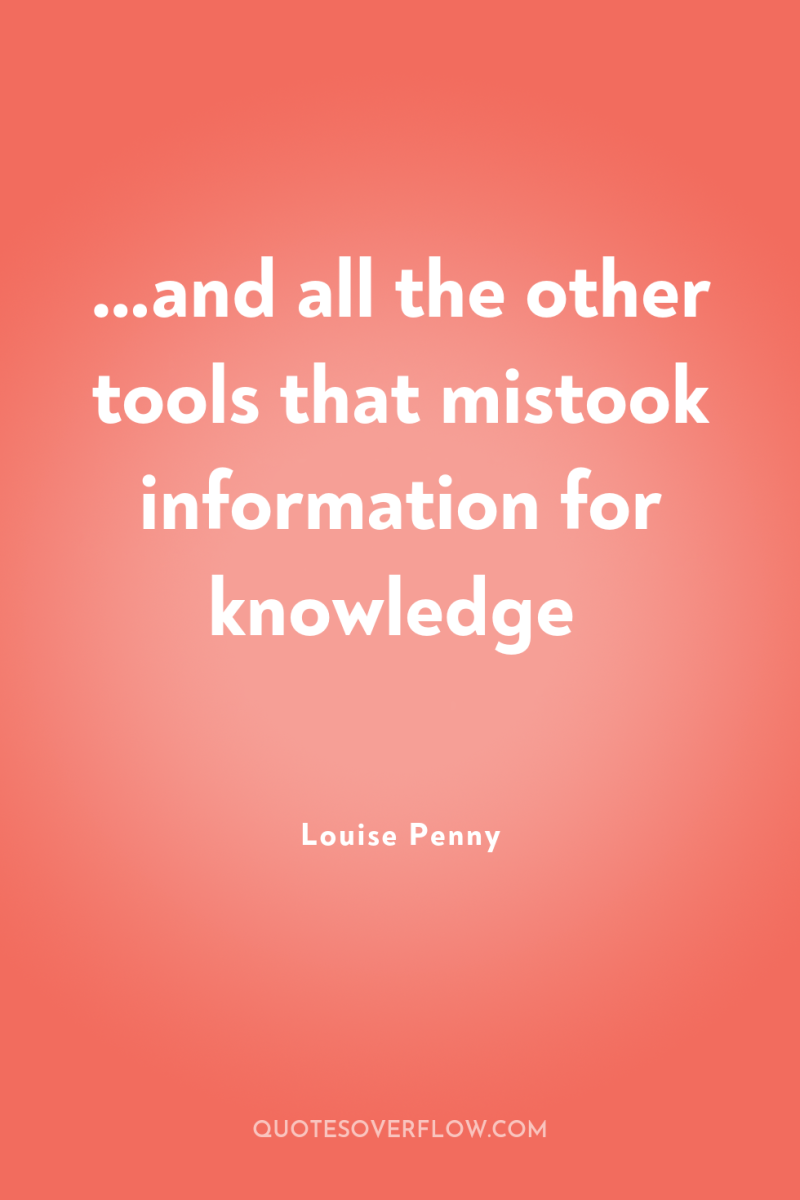
1
…and all the other tools that mistook information for knowledgeLouise Penny
2
A lot of what we know to be history isn’t…it serves a purpose. Events are exaggerated, heroes fabricated, goals are rewritten to appear more noble than they actually were. All to manipulate public opinion, to manufacture a common purpose or enemy. And the cornerstone of a really great movement? A powerful symbol. Take away or tarnish that and everything starts to crumble, everything’s questioned.Louise Penny
3
He had his treasure, but finally all he wanted was his family. And peace.Louise Penny
4
Who hurt you, once, so far beyond repairthat you would meet each overturewith curling lip? While we, who knew you well, your friends, (the focus of your scorn)could see your courage in the face of fear, your wit, and thoughtfulness, and will remember you with something close to love.Louise Penny
5
Joy doesn't ever leave, you know. It's always with you. And one day you'll find it again.Louise Penny
6
…struck. Once. And into that blow he put his childhood, his grief, his loss. He put his mother’s sorrow and his sister’s longing. The menorah, weighed down with that, crushed the Hermit’s skull.Louise Penny
7
That was the danger. Not that betrayals happened, not that cruel things happened, but that they could outweigh all the good. That we could forget the good and only remember the bad.Louise Penny
8
…in the library…surrounded by things far more dangerous than what roamed the school corridors. For here thoughts were housed.Louise Penny
9
Not everything buried is actually dead. For many, the past is alive.Louise Penny
10
And Beauvoir knew then the man was a saint. He's been touched by any number of medical men and women. All healers, all well intentioned, some kind, some rough. All made it clear they wanted him to live, but none had made him feel that his life was precious, was worth saving, was worth something.Louise Penny
11
She’d forgotten to love, but she also forgot to hate. (about Clara’s mother, who had dementia)Louise Penny
12
To be silent. In hopes of not offending, in hopes of being accepted. But what happened to people who never spoke, never raised their voices? Kept everything inside? Gamache knew what happened. Everything they swallowed, every word, thought, feeling rattled around inside, hollowing the person out. And into that chasm they stuffed their words, their rage.Louise Penny
13
Gamache nodded. It was what made his job so fascinating, and so difficult. How the same person could be both kind and cruel, compassionate and wretched. Unraveling a murder was more about getting to know the people than the evidence. People who were contrary and contradictory, and who often didn't even know themselves.Louise Penny
14
Wait, Armand, he heard behind him but kept walking, ignoring the calls. Then he remembered what Emile had meant to him and still did. Did this one bad thing wipe everything else out? That was the danger. Not that betrayals happened, not that cruel things happened, but that they could outweigh all the good. That we could forget the good and only remember the bad. But not today. Gamache stopped.Louise Penny
15
A murder was never about brawn, it began and ended in the brain and the brain could justify anything.Louise Penny
16
I respect people who have such passion. Emile was saying. "I don't. I have a lot of interests, some I'm passionate about, but not to the exclusion of everything else. I sometimes wonder if that's necessary for geniuses to accomplish what they must, a singularity of purpose. We mere mortals just get in the way. Relationships are messy, distraLouise Penny
17
Conscience. Imagine being pursued by your own conscience…. A mountain of conscience. Throwing a lengthening shadow. Growing. Darkening.Louise Penny
18
Shakespeare: …the best way to peace is to have a still and quiet conscience. Or none at all, thought Gamache.Louise Penny
19
In winter the very ground seemed to reach up and grab the elderly, yanking them to earth as though hungry for them.Louise Penny
20
…while men and women perished, and cities fell, symbols endured, grew. Symbols were immortal.Louise Penny